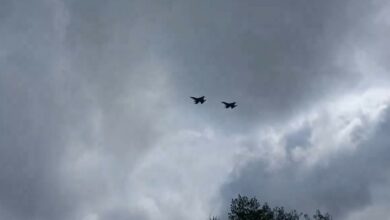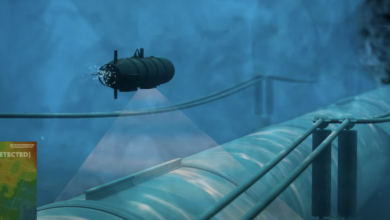
The AUKUS security pact involving Australia, the UK, and the US represents a significant effort to enhance security and defense capabilities in the Indo-Pacific region.
Its primary focus is advancing Australia’s submarine capabilities and fostering greater technological and intelligence sharing among the three members. However, there is a strong argument for extending the framework to include South Korea.
Such an expansion would not only bolster the collective defense posture against rising regional threats but also enhance the strategic balance in East Asia.
South Korea’s Geopolitical Positioning
South Korea’s strategic location makes it a crucial player in East Asian security dynamics.
Sharing a border with North Korea and being close to China, South Korea occupies a vital position. It acts as a frontline state against North Korean aggression and counterbalances Beijing’s expanding regional influence.
The Korean Peninsula has long been a hotspot for tensions and conflicts, making the stability and security of South Korea essential for the broader region. By integrating South Korea into AUKUS, the alliance could significantly enhance its strategic depth and operational reach in East Asia.

Alliance With US
South Korea is a key ally of the United States, with longstanding military and economic ties. The US-South Korea alliance, formalized through the 1953 Mutual Defense Treaty, has been a cornerstone of regional security for decades.
Incorporating South Korea into AUKUS would enhance interoperability and coordination among these allies, creating a more cohesive and formidable defense posture in the region.
It would also reaffirm America’s commitment to the security of its allies and partners in the Indo-Pacific, sending a strong message of solidarity and resolve.
Countering North Korean Threats
Pyongyang’s nuclear and missile programs pose a significant threat to regional stability. The regime’s continued development of nuclear weapons and ballistic missiles, along with its unpredictable behavior, has heightened tensions and insecurity.
The recent summit between Vladimir Putin and Kim Jong-un highlights the potential for increased military and technological cooperation between North Korea and Russia, raising concerns among Western allies.
By including Seoul in AUKUS, the alliance could integrate South Korea’s advanced military capabilities and intelligence assets, providing a more robust deterrent against North Korean provocations. Furthermore, South Korea’s expertise in dealing with North Korean threats, both conventional and unconventional, would be invaluable in enhancing the alliance’s overall readiness and response capabilities.
Balancing Chinese Influence
China’s assertive policies in the South China Sea and its increasing military presence have raised concerns among neighboring countries.
A broader AUKUS framework would send a strong message of unity and resolve, serving as a counterweight to Chinese expansionism.
It would also provide a more balanced and comprehensive approach to addressing the challenges posed by China’s rise, including its economic coercion, cyber activities, and maritime assertiveness.

Advanced Military Technology
South Korea’s advanced defense industry, particularly in missile defense, cybersecurity, and naval capabilities, would complement AUKUS’ technological ambitions.
South Korea has been a leader in developing cutting-edge military technologies and has a robust defense industrial base. Joint development and sharing of these technologies within the framework would enhance its collective defense capabilities.
This cooperation could include advanced radar systems, unmanned systems, artificial intelligence, and electronic warfare, providing a technological edge in countering current and future threats.
Submarine Warfare
South Korea has been developing its own submarine capabilities, including plans for nuclear-powered submarines. Submarine warfare is critical to modern naval strategy, providing stealth, endurance, and striking power.
Collaborating under the AUKUS framework could accelerate Seoul’s efforts, providing access to expertise and technology from the US and UK.
This collaboration would enhance South Korea’s submarine fleet and contribute to the overall submarine warfare capabilities of AUKUS. It would also foster greater interoperability and joint operational planning among the allied navies, enhancing their ability to conduct coordinated and effective maritime operations.

Economic Partnerships
Strengthening defense ties under AUKUS would also bolster economic relationships. South Korea’s advanced technological sector and solid industrial base could lead to collaborative projects and financial benefits for all parties involved.
Defense cooperation often spills over into other sectors, fostering innovation, investment, and trade. Joint ventures and collaborative research and development projects could create new opportunities for economic growth and technological advancement.
Moreover, a closer defense partnership would enhance supply chain security and resilience, particularly in critical sectors such as semiconductors, rare earth elements, and advanced materials.
Diplomatic Leverage
An expanded AUKUS would enhance diplomatic leverage in regional and international forums. This united front could drive more effective policy coordination on issues such as non-proliferation, trade security, and regional stability.
By presenting a cohesive and united stance, the alliance could exert greater influence on the international stage, shaping the regional security architecture and promoting a rules-based order.
It would also provide a platform for addressing other global challenges, such as climate change, humanitarian crises, and pandemics.

Expanding AUKUS
Expanding AUKUS to include South Korea represents a strategic opportunity to enhance regional security, counterbalance rising threats, and foster greater technological and economic collaboration. South Korea’s inclusion would not only strengthen the alliance’s military capabilities and deterrence posture but also promote a more integrated and resilient approach to the complex security challenges in the Indo-Pacific.
In an era of shifting power dynamics and emerging threats, highlighted by the recent Putin-Kim Jong-un summit, a broader AUKUS alliance with South Korea would serve as a powerful pillar of stability and security.
By leveraging the strengths and capabilities of all member states, such an expanded alliance would be better positioned to uphold peace, stability, and prosperity in the Indo-Pacific and beyond.
 Jihoon Yu is a research fellow at the Korea Institute for Defense Analyses.
Jihoon Yu is a research fellow at the Korea Institute for Defense Analyses.
Jihoon was a member of the Task Force for South Korea’s light aircraft carrier project and Jangbogo-III submarine project. He is the main author of the ROK Navy’s Navy Vision 2045.
His areas of expertise include the ROK-US alliance, the ROK-Europe security cooperation, national security, maritime security, and maritime strategy.
He earned his BA in International Relations from the ROK Naval Academy, MA in National Security Affairs from the US Naval Postgraduate School, and a PhD in Political Science from Syracuse University.
 Yonghan Park is an associate research fellow at the Korea Institute for Defense Analyses and North Korean Military Division.
Yonghan Park is an associate research fellow at the Korea Institute for Defense Analyses and North Korean Military Division.
His expertise includes North Korean military and naval security.
He received his PhD at the Department of North Korean Studies at Korea University.
The views and opinions expressed here are those of the author and do not necessarily reflect the editorial position of The Defense Post.
The Defense Post aims to publish a wide range of high-quality opinion and analysis from a diverse array of people – do you want to send us yours? Click here to submit an op-ed.











